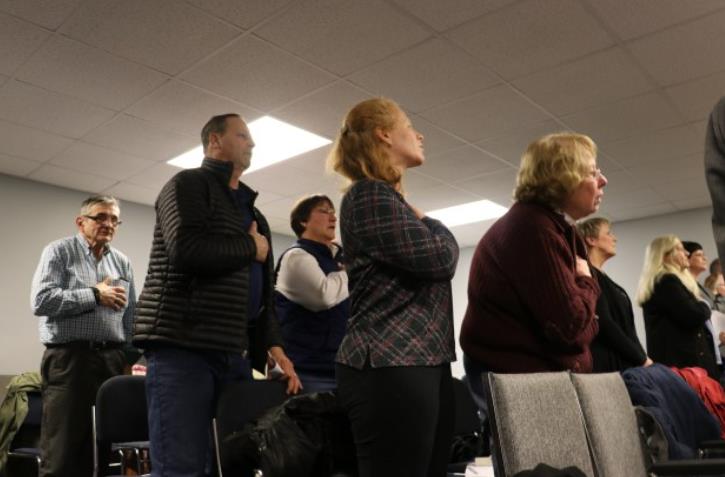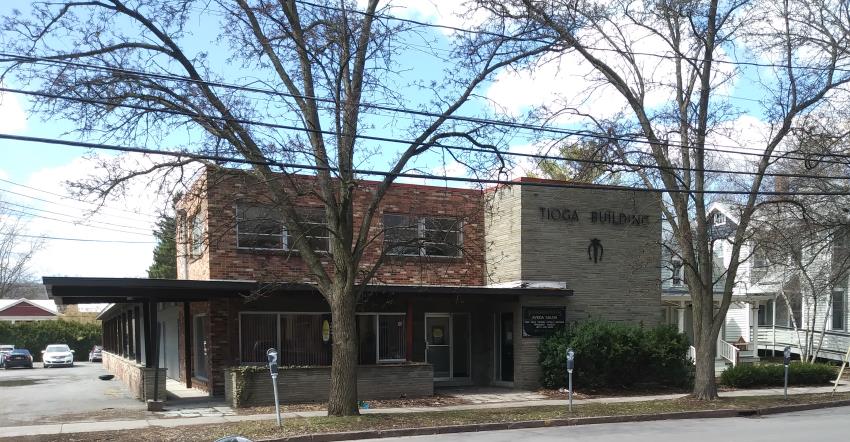Cortney Bailey to Challenge Redmond for Enfield Supervisor
Allinger, James seek new terms in Newfield
By Robert Lynch, May 29, 2021

Yes, there will be a political contest this year for Enfield Town Government; but just for one race—the one at the top.
Filings released this week by the Tompkins County Board of Elections confirmed that Cortney Bailey, current President of the Enfield Community Council, will challenge Democratic Town Supervisor Stephanie Redmond for the two-year Supervisor’s term that begins next January.
Bailey will run as an Independent candidate, without any political party endorsement. Redmond, elevated to Supervisor by the Town Board during a tumultuous meeting last January, already had secured an easy path to the Democratic nomination, finding no opponent within her own party during petitioning that ended in March and thus avoiding a primary. Had Bailey not entered the race, Redmond would also have cruised to the General Election without an opponent.
Still, the Redmond-Bailey contest will be the only Town-wide race on this fall’s Enfield ballot. The Board of Elections reported it received no petitions for any of the three Enfield Councilperson seats up for election. As a result, recently-appointed Councilpersons Jude Lemke and James Ricks, along with newcomer Cassandra Hinkle, Democratic nominees all, will likely win reelection without opponents. Only a write-in campaign could block their election.
Similarly, Enfield Town Clerk Mary Cornell, Highway Superintendent Barry (Buddy) Rollins, and Town Justice Betty Poole will face voters in November without opposition.
Meanwhile, in neighboring Newfield, Independent Town Supervisor Michael Allinger, elected to fill a vacancy two years ago, has now petitioned for his first complete four-year term. Current Newfield Councilperson Joanne James, a Democrat, joined Allinger in petitioning for an Independent line under the “Better Newfield” party. Newfield’s remaining Town Board incumbent up for election, Christine Laughlin, filed petitions earlier to run as a Republican nominee.
So far, no opponents for any of the Newfield Town Board incumbents have emerged.
The Board of Elections filings have also confirmed that two of the three candidates seeking to succeed Republican David McKenna on the Tompkins County Legislature have sought additional ballot lines.
Republican Randolph Brown of Newfield filed petitions to run as an Independent under the “Rural Issues” banner. Democratic candidate Robert Lynch (this writer), who faces an opponent in the June 22nd Democratic Primary, has also petitioned to run in November under the self-chosen “Tompkins-Southwest” designation. The race’s other Democratic candidate, Vanessa Greenlee, already endorsed by the Working Families Party, did not petition for an Independent line.
Local candidates often seek second-line designations so as to assure them November ballot placement should they lose a primary, or else to woo support from those reluctant to vote for a candidate from a rival political party.
****
As for Bailey, a 40-something mother of two from Gray Road, her candidacy adds a new dynamic to this fall’s Enfield elections. Heretofore, only McKenna’s County Legislature seat was thought to be in play, and its contest would only have impacted that part of Enfield from the Route 79 centerline south. Bailey’s candidacy now means everyone in Enfield will have a reason to vote.
Contacted for this posting, Cortney Bailey declined immediate comment on either her candidacy or about the Enfield Town issues she may raise in her campaign. However, Bailey has previously confided that she intends to run strictly as an Independent, not aligned with any other candidate or party.
In recent months, Bailey has been instrumental—some have credited her as the driving force—behind the Enfield Community Council’s (ECC’s) acquisition of the former Living Water Christian Fellowship Church at 162 Enfield Main Road and ECC’s converting it into a community center. The renovated facilities opened this spring and provide the ECC its first permanent location for youth activities and other community events.
Because the ECC receives Town funds through its budget, and to avoid a conflict of interest, Bailey would likely resign as the organization’s president should she win the office of Town Supervisor.
Stephanie Redmond, now less than five months into her permanently-appointed position of Enfield Supervisor, assumed Acting Supervisor duties last October upon former Supervisor Beth McGee’s resignation. Redmond, elected a Town Councilperson in 2019, and then appointed Deputy Supervisor by McGee in April of last year, resigned her Town Board seat after McGee’s departure so as to smooth her path to a permanent appointment.
The political maneuverings culminated in a tense January 12th meeting at which two Town Board members threatened to resign if Redmond was not elevated, and Councilperson Robert Lynch later said he felt a figurative “gun” had been placed to his head forcing him either to confirm Redmond’s appointment or else leave the Town “dead in the water,” unable to conduct business or to pay its bills.
Lynch voted to appoint Redmond Supervisor that night but warned of its consequences. Not coincidentally, Lynch then circulated Bailey’s petitions during April and witnessed more than half of their signatures.
###
Newfield Board will seek public input on a “Greener” Building Code
by Robert Lynch, May 27, 2021
“We should have a Public Hearing for what Public Hearings are for,” said Board member Casey Powers, namely “to hear what people have to say.”
And so they will.

The Newfield Town Board Thursday (May 27th) tentatively set a date about two months hence to gauge citizen input on whether to adopt the New York “Stretch Energy Code,” an optional building code that would set tougher energy-saving and climate-conscious rules for new construction, residential and commercial.
The Enfield Town Board, like Newfield, is contemplating the Stretch Code’s adoption, but has not yet taken the step forward that Newfield did Thursday.
The Newfield Board will likely hold its hearing July 22nd to coincide with its monthly work session. Adhering to that date will depend on whether a local environmental consultant, an expert on the code, can be on hand to answer questions about the regulation’s impact.
But Newfield Board member comments Thursday made clear that accepting public opinions will not necessarily bring quick adoption of the Stretch Code, despite the fact that experts predict New York State would likely mandate the upgrades in the next couple of years.
“To me, a building code is a lot of safety stuff,” remarked Newfield Councilperson Christine Laughlin, the Stretch Code’s most cautious skeptic. Laughlin termed the Stretch Code’s provisions “fluff,” categorizing them as offering “choices” for the builder, not necessarily “mandates” deserving imposition.
“I really feel it’s their choice,” said Laughlin. “If it will come through the State” eventually, she argued, then “let it come through the State.”
Laughlin said she’d like to hear what contractors think of the tougher code, and will reach out to urge they attend the hearing. Meanwhile, Councilperson Heather McCarty, perhaps the most knowledgeable about the code’s specifics, will serve as point-person to urge general attendance.
In its online documents, the State agency most aggressively promoting the Stretch Code claims the code’s provisions could save nearly 20 per cent annually on utility bills, based on statewide averages. At an Enfield presentation last June, a consultant was more cautious, predicting a 12 per cent savings here, and a 12-and-a-half year payback on the investment. Building to meet the new code could add about $2,000 to a new home’s cost.
Returning to those matters of “choice,” Laughlin questioned whether her Town should mandate such code specifics as wiring a home for future solar panels or implanting conduits to supply power to electric cars.
On another topic, the Newfield Board learned Thursday that its intermunicipal broadband study, now underway, will cost its taxpayers more than first thought. The Board approved up to an additional $4,000 for a road-by-road survey to learn where cable-tethered broadband Internet exists and where it does not.
When Newfield authorized $5,000 last fall for the County-sponsored broadband analysis, the Newfield Board—like Enfield and most other towns—thought the payment would include the survey. But now, learning differently, Board members saw no alternative but to toss in the extra cash.
The Enfield Town Board may have to follow Newfield’s lead in the coming weeks.
Remarked Newfield Bookkeeper Blixy Taetzsch, “We were all misled as to how the data was going to be gathered.”
An independent contractor, already used by the Town of Lansing, will collect the road-by-road data at $35 per hour. Though the research should ideally be finished by the time the local Broadband Study Committee next meets June 4th, Newfield Supervisor Michael Allinger doubts the contractor can finish that soon.
###
One “Vote” Over the Line?
Lawmaker’s publicly-paid plug may have swayed school election
by Robert Lynch, May 19, 2021
It was six-thirty in the evening on the third Tuesday in May. Tompkins County legislators stood an hour into their twice-monthly meeting. But it was also little more than two hours before polls would close statewide in school district elections. One of Dryden’s County legislators, Martha Robertson, had taken her turn at privilege-of-the-floor—a self-serving gabfest mocked by some as the “quilting bee.” However, in this instance, the Dryden lawmaker’s verbosity may have tiptoed—perhaps even vaulted— over the unwritten line, breaching that unregulated boundary separating taxpayer-paid duties from raw trolling for votes.

“I’ve gotten involved in the Dryden School Board elections this year,” said Robertson. “And I’m going to make a pitch for anybody in Dryden who’s listening and hasn’t already voted. [I] hope you’ll vote for Bridget Flanigan and Justin St. Juliana.”
And later that night, the Dryden results came in. Both Flanigan and St. Juliana had won—but only by a cat’s whisker.
Unofficial tallies showed Bridget Flanigan in the lead for the Dryden District’s four seats up for election. Justin St. Juliana had snared a separate three-year position with the second-highest tally. Flanigan drew 606 votes and St Juliana 599. Justin had earned just eight votes more than had Nancy Crawford, who had to settle for a shorter, two-year term. St. Juliana polled only 27 votes ahead of the highest-ranking loser, Joan Stock.
Both Stock and a second loser, Lawrence Lyon, are School Board incumbents. A third Dryden incumbent, Ronald Szymanski, won the remaining three-year term in the election, but nonetheless, fell four votes short of St. Juliana.
In what’s received minimal wider news coverage until now, Dryden’s School Board incumbents and challengers have found themselves immersed in a controversy centered about racial politics. According to media reports, two Dryden High School seniors, student board liaisons Jackson Crocker and Heidi Nydam, briefed the School Board last September on their plans to hold a Black Lives Matter rally in the village.
But they got School Board pushback, with Board member Kelly Daley quoted by a Syracuse media outlet, cnycentral.com, as labeling BLM as a “Marxist” organization and calling the wearing of Black Lives Matter shirts “offensive.” Some, including a Dryden teacher, have called for Daley’s resignation. Daley has not stepped down, and her position was not on Tuesday’s ballot. Because of COVID-related restrictions, students never held the rally.
But back to the County Legislature: Dryden’s Robinson referenced the brewing hometown racial controversy as she continued her floor privileges Tuesday.
“Four of the candidates on the ballot are actually on record saying they think racism is not a problem in the Dryden School District,” alleged Robertson. “I’ve personally heard stories of parents who’ve actually taken their kids out of the Dryden District because their kids felt—persons of color felt—unsafe and unwelcome. So Bridget and Justin are the two candidates who will change the climate…..”
At that point, Enfield-Ulysses legislator Anne Koreman had heard enough. She interrupted Robertson in mid-sentence.
“I’m sorry, Martha,” said Koreman, “I don’t know how other people feel, but I just feel uncomfortable with, at a County Legislature meeting, talking about who we’re going to—who we want to be on the School Board.”
Robertson stood taken aback, yet only for a second.
“Well, I’m gonna’ just finish,” the Dryden Democrat said with mild nervousness laced with a touch of pique. “So people should go and vote ‘til nine o’clock, whoever you’re in favor of.”
But then, Robertson regained her composure, and launched forward.
“I just wanted to say it’s an issue [race relations] that, you know, this County Government has certainly been on record as taking aggressive action to try to improve the climate, within County Government and within the county more largely.”
At that point, Robertson moved on to other patches of the legislative quilt. No one raised further comment.
Robertson will retire from her 20-year tenure on the Tompkins County Legislature at year’s end. Koreman seeks a second, four-year term.
###
Tompkins lawmakers support NY Single Payer Health Care… again
by Robert Lynch, May 18, 2021
Nobody was quite sure. Maybe it was the fourth time they’d taken this vote over the past 15 years; perhaps the sixth. But on the eve of an important State Senate committee decision, the Tompkins County Legislature Tuesday (May 18th), by a lopsided, party-driven margin, urged New York to enact single payer health care for all state residents.
“After nearly more than a year of this global pandemic, it is clear that universal guaranteed health care is not only sound public health policy, but a necessity for a just economic recovery that centers racial and economic justice,” said Enfield’s Joanna Green, speaking before Tuesday’s vote on behalf of the Eastern Southern Tier Poor People’s Campaign.

The County Legislature’s vote reflected the partisan wedge that the single payer cause—better known currently as the New York Health Act—has driven into State politics. All the County Legislature’s Democrats supported Tuesday’s measure. Two of the body’s three Republicans, including Enfield’s David McKenna, opposed it.
Earlier in the day, Green had sought to rally Enfield Democrats to speak at the Legislature’s evening meeting and also to lure McKenna to her side. Not only did she fail to win McKenna’s support; she only drew one ally to the Legislature’s virtual session, namely Newfield legislative candidate Vanessa Greenlee.
As it adopted the largely-symbolic endorsement of New York single payer, local legislators also beat back Lansing Republican Mike Sigler’s substitute Resolution, one that, rather establish single payer, would have urged the State to fund all cancer treatment for every afflicted patient.
In advancing his alternative, Sigler noted that New York legislators have had zero success in their many years of pushing single payer statewide and that states including Vermont and California have failed to implement their own single payer measures because of the high cost. As compared with single payer, Sigler described his alternative as “half a loaf.”
Sigler’s colleagues, including Dryden’s Mike Lane, admitted that cancer is a scourge that deserves State attention, but so too, they said, do other diseases.
Lansing Democrat Deborah Dawson commended Sigler’s measure as a “very thoughtful and useful approach,” but quickly added, “Cancer is a scourge, but so is the health insurance business model.”
Despite their partisan endorsement, not all of the Legislature’s Democrats accorded the New York Health Act unqualified support. Ithaca Democrat Rich John stood most critical.
John said his endorsement came with “reservations.” John feared that extra health care costs might cripple small business, including non-profit agencies. He said the plan could impact New York companies competing with those across close state lines. And then there’s the way State Government mismanages so much of what it touches.
“If you look at the operation of New York State, they seem to struggle with the most basic ministerial actions,” observed John. “They cannot do these things in an efficient, clear, simple way for the people who live in New York State…. And entrusting them to pick up the ball and build something as necessary and elaborate as this and to do it in cost effective way… I worry.”
Tuesday’s long-winded, cover-every-base, 21-paragraph County Resolution now gets forwarded to lawmakers in Albany, where the single payer bill had been prepped for an upper house Health Committee vote, yet was purportedly pulled by the Senate’s majority leader at the last minute. Local supporters have argued that with Democratic super-majorities in both the Senate and Assembly, party-line votes could drive the measure to adoption, despite a possible gubernatorial veto.
Enfield advocate Green suggested that single payer’s adoption in New York, could “lead the way” toward establishing the practice nationally.
Legislator John, meanwhile encouraged a more measured approach, alluding to Washington’s adoption of a nationwide public option tied to the Affordable Care Act. “I would far prefer if our national Congress could actually get its act together,” he said. “It would be far preferable if we could do this as a country.”
###
God, Gays and Government
Supervisors, past and present, fault religious broadcaster’s Enfield plans

by Robert Lynch; May 14, 2021
It began as a frank, yet banal discussion about broadcast diversity and localism. But as soon as Enfield’s former Supervisor had entered the mix, Wednesday’s Town Board meeting (May 12th) headed to a place that mills the fodder to feed the culture wars. And by the time the meeting had ended an hour later, the former Supervisor’s replacement had suggested colleagues join her to urge regulators find a religious broadcaster unfit to license Enfield’s first radio station.
“I don’t really see any need for this, to be fair,” said former Supervisor Beth McGee, whom Board members permitted to comment on Family Life Ministries’ plans to plant a new FM station in their town. “I know this station very, very well,” said McGee. “I cannot believe that we’re actually entertaining inviting this to our community.”
Family Life Ministries, based in Bath, and operator of more than two dozen full-power Christian-formatted stations scattered about central/western New York and northern Pennsylvania, approached the Enfield Planning Board earlier this year proposing to build a 199-foot unlit radio tower in a remote field north of Enfield Center Road. The proposal sailed through a Planning Board hearing May 5th. But Family Life’s licensing plans still remain before the Federal Communications Commission. And it was Family Life’s management and programming, not its physical facilities, that drew the Town Board’s attention Wednesday night.
Councilperson Robert Lynch (this writer) had invited the ministry’s president, Richard Snavely, to acquaint the Town Board with the broadcaster’s proposal to relicense from Horseheads to Enfield a long-existing station, WMTT-FM, an outlet Family Life acquired in an ownership swap, but one that its new holder would prefer serve the Ithaca market. After Snavely outlined his plans, Lynch probed politely as to how a regionally-strung chain of stations, each with virtually identical programming, could serve the local needs and cover local news. On that latter point, Snavely conceded it couldn’t.
But once McGee took the floor and turned attention away from hometown staffing and toward religious politics, one particular Family Life program, namely the syndicated Focus on the Family, became a prime target:
“Focus on the Family raises hundreds of millions of dollars to defeat LGBT communities; transgender laws,” asserted McGee, who identified herself as both Enfield’s former Supervisor and also as “formerly a very religious person.” Said McGee of the syndicated show she claimed she knew full well, “They work against marriage equality. They’re for conversion therapy. Is this really for the public good?”
Snavely responded that, to his knowledge, the fundraising figures cited by the former Supervisor were inaccurately high. He also disclaimed McGee’s assertion that Family Life may discriminate against gays or has a policy seeking to deny its women employees access to birth control.
But, Snavely conceded, “We are a Christian organization, and we do believe in certain principles that are Biblically-based, and we don’t apologize for that.”
“In the country that we live in,” said Snavely, “we have the right to be able to broadcast various programs. Focus on the Family does not raise hundreds of millions of dollars. I see their financials. They are very pro-family oriented.”
Though Councilperson Lynch cautioned he would not join fellow Board members in challenging Family Life’s reassignment, he drew upon his experience as a former broadcaster and engineering consultant to counsel colleagues that should the Town Board conclude a station “was irresponsible and should not be in the community,” it could lodge an Informal Objection against Family Life’s pending license reassignment. Supervisor Stephanie Redmond, McGee’s successor, liked the idea and based her call for action upon a “simple Google search” that she said she’d done during the meeting.
“Focus on the Family has raised over $515 Million over the past five years, making it one of the most well-funded anti-LGBT organizations in America,” Redmond quoted from Google to the Board.
“I don’t like that kind of influence on our community,” Redmond asserted. “I really feel like we are a community of inclusion… I don’t support an organization like that.”
Though Councilperson Virginia Bryant placed support behind Redmond’s initiative to write the FCC, fellow Board member Jude Lemke stood more reticent.
“If that’s true,” said Lemke, referring to Redmond’s quotation, “I would have concerns. But I’m not sure I always believe everything I read. I’d want to do some more investigation to make sure it’s really true.”
Redmond conceded Lemke’s point.
Lynch further cautioned that based on past local complaints lodged against broadcast consolidation, the FCC would likely “summarily dismiss” any Town-authored Objection. Lynch said he, personally, would not go so far as to urge the Family Life application’s dismissal. But he suggested Board members might choose to write the agency individually.
Either together or one-by-one, that writing may, indeed, happen. During the meeting’s final minutes, with Snavely having left, McGee re-entered the zoom room with her final comments:
“I would be really proud of a Town Board that would write a collective letter that would stand up against the fight against marriage equality, or the discrimination against transgender people, or the discrimination against women’s bodily autonomy,” McGee said. “That would be something that I think we could all be proud of.” Bryant concurred.
But also addressing the Board, tossing in an opinion he said he threw to offer “the flip side,” Rumsey Hill Road’s Marcus Gingerich advanced a competing view. “If you don’t agree with a radio station, that’s what the selector switch is for.”
###
County agency hangs a “taxing” cloud over Enfield solar farm
by Robert Lynch, May 13, 2021
“This doesn’t seem like it’s worth our time,” a bewildered Mike Sigler observed in frustration. “It generates so little tax revenue, maybe it’s not a viable project.”

The Lansing legislator did not stand alone as the Tompkins County Industrial Development Agency’s (IDA’s) governing board Wednesday (May 12th) discussed for an hour and then handed off to Enfield’s Town Board a tax abatement plan advanced by developers of the town’s proposed mammoth new solar farm off Applegate Road, a plan that would cut payments to the Town, County, and the Ithaca School District far below the agency’s usual benchmarks.
“In view of everything we’re hearing today, I’d like to see it go back to the Enfield Town Board and have them give us a thumbs up or down on it,” said IDA Board member Todd Bruer as Wednesday’s discussion concluded.
Several hours later, with both a developer’s executive and attorney on hand, the Enfield Board did, in turn, take up the abatement. But the Board reached no decision. Instead, it agreed to revisit the matter at a later meeting, June first.
Rochester-based Norbut Solar proposes a 15 Megawatt solar farm, Enfield’s largest, to be sited on farmland east of Applegate Road and south of Route 79. Norbut’s proposal has already cleared the Planning Board’s site plan review. But Norbut and the IDA have yet to agree on a so-called PILOT agreement for payments in lieu of property tax. On May third, in filings with the IDA, Norbut proposed a 30-year PILOT Agreement with its starting annual payment a mere $3,000 per Megawatt, or $45,000 in total. That rate falls more than 28 per cent beneath the low-end of the IDA’s current standard for solar farm PILOTS, that standard in a range of $4,200 to $4,800 per Megawatt.
Further complicating the discussions is Norbut’s offer of $1,200 per Megawatt to the Town of Enfield in a “Host Community Agreement “(HCA), a municipal incentive given little standing under New York law. HCA moneys would go only to the Town. PILOT funds would be split three ways, with the Ithaca City School District receiving the largest share.
“I personally don’t like the Host Community Agreement,” company manager David Norbut bluntly told the IDA Wednesday. “I’d prefer a $4,200 PILOT without a Community Host Agreement… I’d prefer we do $4,200 straight,” but “Enfield wanted more in it for them.”
A summary narrative presented the IDA Board of Directors with its Agenda Wednesday implied, misleadingly, that Enfield had already approved the $1,200 per Megawatt HCA amount. It had not. Enfield Councilperson Robert Lynch (this writer) informed the IDA that his Town Board has taken no action. Lynch urged the IDA Board to postpone any decision of its own until his Board has had the opportunity to weigh in.
The IDA Board could have set a future Public Hearing on the Norbut PILOT on Wednesday. But it did not, preferring to hear from the Town Board first.
Nonetheless, based on Town Board discussions later that evening, Enfield may hold limited bargaining power and may be forced to decide among several imperfect choices.
“The Town is not permitted to require a Host Community payment or any sort of payment in exchange for zoning approvals,” Norbut attorney Ashley Champion warned the Enfield Board. There’s no provision in New York State law that allows a Town to require a Host Community Agreement for any reason.” It’s not “a legally permissible bargain,” Champion said. She implied a Board requiring an HCA would be seeking a bribe.
Enfield’s only power, therefore, would lie in its authority to urge the IDA to either approve or reject the underlying PILOT. But if the Town recommended the IDA reject the $3,000 compensation as too stingy, the IDA could then boost the PILOT to $4,200 so as to capture within it the Host Community funds. Norbut might then respond by canceling the company’s legally-unenforceable HCA.
At Wednesday’s earlier meeting, Heather McDaniel, the IDA’s Administrative Director, took pains to note that her materials had referenced the Community Host Agreement only because Norbut had employed it to justify its under-benchmark PILOT compensation. And McDaniel made clear that negotiation of the Host Agreement stands strictly as a Town matter, not one in which the IDA chooses to entangle itself.
“We’re not going to have a group negotiation,” McDaniel emphasized.
McDaniel also conceded that the IDA’s present PILOT benchmarks may stand higher than the current market can bear.
“This issue has been a moving target for several years now,” McDaniel said of the solar farm market. Ithaca area electricity prices are among the lowest in the state. Utilities have raised their interconnection charges, and governmental incentives have fallen. “These projects would not happen if they were at full valuation,” she said.
“We are waiting out a perfect storm,” David Norbut told the IDA. “Steel prices have gone absolutely bonkers.” Norbut told the agency that if a higher PILOT compensation were demanded, Norbut might choose to wait several years on the Enfield project and allow the market to cool down. But he said a 3-4 year delay could mean 5-6 years before the Enfield project would be energized.
But that evening, speaking before the Enfield Board, Norbut’s Jon Stone effectively refuted his boss’s suggestion that project delay could work in everyone’s favor.
Addressing potential long-range price decreases, Stone said, “My professional guidance is that that’s not happening. We would be playing a very, very dangerous game by waiting this out. Things go up typically and rarely go back down.”
“Waiting is the enemy of these projects,” attorney Champion chimed in. “Once you have the opportunity, you really have to jump on it.”
But the parties’ affirming a bare-bones PILOT, however it’s structured, could shortchange the Town for the next three decades, given that Norbut seeks abatement at this, a likely weak spot in the solar market.
“We must craft its terms correctly up front,” Councilperson Lynch said of the PILOT Agreement in comments read before the IDA Wednesday, “or else live with their unpleasant consequences for decades. Patient deliberation will serve us well.”
In a comparative spreadsheet Lynch presented the Town Board prior to its own meeting, IDA records revealed that for the much-smaller Delaware River Solar farm on Enfield’s Podunk Road, Delaware’s PILOT, approved in 2018, paid $8,000 per Megawatt, more than two and a half times the figure Norbut now proposes.
Circumstances then were different, Stone cautioned the Town Board. Government incentives were greater; costs less.
But the lingering sticking point now could be the balance between the PILOT Agreement, which benefits three taxing jurisdictions, and the HCA, whose proceeds only Enfield could tap.
At the IDA’s meeting, Board members Martha Robertson and Rich John, both Tompkins County legislators, questioned the Host Agreement and its potential interference with an otherwise straightforward tax abatement plan. Robertson noted that apportionment of solar farm proceeds complicated an earlier review of a project in Dryden, and that the same could happen here.
“Where the money goes is a substantial change,” Robertson said, arguing that $4,200 as a combined compensation figure differs greatly from $4,200 as a stand-alone PILOT.
“I have the same concerns as Martha,” colleague Rich John echoed. Legislator John said there’s “precedential importance” to Community Host Agreements. “If we go down the path of Host Agreements,” he argued, “we could invite it for every application,” not just for solar farms.
And attentive to the leadership change inflicting Enfield of late, Robertson offered Norbut officials her seasoned advice: “The Enfield Town Board has, shall I say, [had] a lot of transition in the last few months. It’s not exactly stable. So get things in writing.”
###
Solar developer seeks cut-rate taxing plan for Enfield farm
by Robert Lynch, May 9, 2021
The Town of Enfield might get the best deal of all, yet other taxing jurisdictions would take it on the chin under a Payment in Lieu of Tax (PILOT) Agreement proposed to Tompkins County authorities by the developer of Enfield’s $20-Million solar farm off Applegate Road.

Under a 55-page proposal submitted to the Tompkins County Industrial Development Agency (IDA) May 3rd and released by the IDA last Thursday (May 6th), Rochester-based Norbut Solar Farms would pay the Enfield Town, Tompkins County, and the Ithaca City School District a combined $45,000 annually in lieu of property taxes during its first year of Enfield operation. Compensation would climb by two per cent annually thereafter for a period of 30 years.
Yet the figure, calculated by Norbut on a per-Megawatt power generating capacity basis, falls more than 28 per cent below the IDA’s typical low-end assessments for solar taxing plans of its type.
In its statement to the IDA, Norbut claimed recent regulatory changes have brought hardship.
“The cash flow from the proposed project does not support higher payments to the TCIDA or the Town of Enfield due to the reduction in New York State incentives and the increase in construction costs due to the COVID-19 global pandemic,” said Norbut Solar’s David Norbut in his two-page narrative at the top of his company’s lengthy submission.
Last October, Norbut unveiled its plans to construct a 20 Megawatt Enfield solar farm east of Applegate Road and south of State Route 79. In March, the developer scaled the project back by 25 per cent to 15 Megawatts due to connection limitations dictated by the NYSEG utility. Town officials have generally supported the Norbut project. But the Town Board has yet to weigh in on the compensation plan.
Enfield’s Board has scheduled discussion of the Norbut venture at its monthly meeting Wednesday night, May 12th. But the Town’s meeting will come four hours after the IDA’s Board of Directors meets to consider the PILOT. The timing leaves no opportunity for Town Board action prior to when the IDA might vote.
Despite the trimmed-down PILOT, Enfield would benefit more than would other local taxing authorities. Instead of putting all of its governmental compensation under a PILOT Agreement, where money would be split three ways, with schools getting the lion’s share, Norbut’s plan would set aside as much as $18,000 a year in supplemental payments to the Enfield Town under a so-called “Host Community Agreement.”
By funneling more money directly to Enfield, the Norbut plan would invariably shortchange both County Government and the City School District. Under an apportionment formula Norbut officials shared with Enfield’s Town Planning Board last fall, the School District would reap a full 66 per cent of PILOT proceeds, the Town 28 per cent, and the County just 5.5 per cent.
In its “Project Overview” summarizing the Norbut submission, IDA officials acknowledged that “the IDA’s standard solar PILOT” assessment ranges in its first year from a low of $4,200 per Megawatt generated to a high of $4,800. Norbut proposes only a $3,000 per Megawatt payment in its first year PILOT.
The IDA acknowledged that without any PILOT plan at all—in other words, relying upon the State’s standard assessment formula for solar farms—the Norbut venture “is not financially feasible.” Under State-formula taxation, the IDA said, Norbut might pay in taxes as much as $400,000 per year. With the PILOT, total initial compensation would approximate $45,000, increasing to $63,000 once the host community payments to Enfield were added in.
In expressing their general support for the project, IDA administrators pointed to potential creation of as many as 50-70 temporary construction jobs, though the agency admitted that “no on-site direct jobs” would result from the project. The IDA claimed Norbut has already expended “over $406,000 in predevelopment costs,” though, of course, a future PILOT agreement would not impact moneys already spent. The IDA calculated construction workers might spend $400,000 to $600,000 on “food, lodging, entertainment and amenities” while building the array. But that estimate also implies that most workers would come from out-of-town.
Beyond the financial benefits, the IDA’s summary claims “The project will reduce carbon emissions by providing renewable energy generation.”
Reaction: “My initial review of the Norbut PILOT applications disturbs me,” said Enfield Councilperson Robert Lynch (this writer), in written remarks he intends to present the IDA Board of Directors prior to Wednesday’s meeting should the Town Board not weigh in as a group.
“The PILOT Agreement Norbut requests would save the solar developer a windfall in taxes over the plan’s 30-year life,” wrote Lynch. “We must craft its terms correctly up front or else live with their unpleasant consequences for decades. Patient deliberation will serve us well.”
Lynch said he will urge the IDA Board of Directors to hold off any action on the Norbut PILOT Wednesday. At least a month’s delay, he said, will give time for Enfield’s Town Board, as well as other taxing authorities, to weigh in. Lynch’s suggestion late Thursday that Enfield’s Board convene a special meeting prior to its next Wednesday night session went unanswered into the weekend. The inaction precluded any special session, which must be publicized two days in advance.
Meanwhile, Norbut officials warn that their project lies on the financial brink, and that without a PILOT Agreement calculated at the low end, their plans for the Enfield solar farm might fall through.
David Norbut, in his letter to the IDA, claimed the reduction or loss of two earlier incentive programs have cost the Enfield project nearly $13 Million in expected funding. The combined setback, he said, “has the result of the Company not being able to support IDA PILOT payments and Town [Host Community] payments above $4,200 per Megawatt total.”
###
New radio tower clears Planning Board Hearing; no complaints
by Robert Lynch, May 5, 2021
In some towns, proposed broadcast towers raise howls of objections. And in some instances, those objections can kill a project. Not in Enfield.

At a sparsely-attended, non-confrontational 30-minute Public hearing, a session some station owners would die for, the Enfield Planning Board Wednesday (May 5th) took public comment on Family Life Ministries’ proposal to construct a 199-foot FM radio tower north and west of Enfield Center and Sheffield Roads, far removed from either of those roadways and a healthy distance from the nearest house.
“This site works,” proclaimed Richard Snavely, Jr., President of Family Life Ministries. “It has a good look over an area we don’t cover very well,” namely the City of Ithaca.
Family Life’s proposal, currently pending before both the Federal Communications Commission and the Town’s Planning Board, would relicense a commercial FM station in Horseheads to Enfield. The self-supporting, unlighted tower would stand some 1500 feet north of Enfield Center Road and 1800 feet west of Sheffield. A new driveway would be cut to the wooded site and a primary electric line run underground.
Only four people addressed the Wednesday Public Hearing; two of them nearby residents; another a Town Board member (this writer) and the fourth a curious resident from elsewhere in the town. All commenters had questions, but no objections. Therefore, pending completion of a State-mandated environmental review, Planning Board approval stands likely.
The two neighbors, both members of the Drake family, questioned the new station’s potential health impacts and electronic interference, questions that the broadcaster answered to their satisfaction. Snavely said interference is more pronounced at the lower end of the FM dial, not in the center spectrum (101.1 MHz.) where Family Life’s station would broadcast. He added that complaints customarily arise only with high-power, 50 kilowatt stations. Snavely’s would only radiate 3.5 kilowatts.
Enfield Councilperson Robert Lynch questioned Snavely about driveway widths and electrical access. He also invited Family Life’s president to attend the Town Board’s May 12th monthly meeting to discuss non-technical aspects of the broadcaster’s proposal.
Family Life operates some 28 FM broadcast stations in central and western New York and northern Pennsylvania. All broadcast virtually-identical, Christian-formatted programming, originating from a main studio in Bath and delivered to each station via satellite. Though the move-in station from the Elmira market would make Enfield its licensed community, Snavely made no secret that the relocation’s purpose is to better serve Ithaca’s lower elevations, places that lack adequate reception from the group’s other stations.
Because the proposed tower would stand just one foot shy of the federal government’s 200-foot threshold, aviation rules permit it need not be painted or lighted.
However, because the Town of Enfield has no zoning law and the tower would stand higher than 100 feet, New York environmental regulations will likely mandate a more extensive “Type 1” environmental review, a process Planning Board Chair Dan Walker intends his Board to take up in June.
“I personally don’t see anything that would be a major environmental impact,” Walker observed. The Board Chair doubted Family Life’s plans would require a full-blown Environmental Impact Statement.
Meanwhile, Enfield planners, on advice from the Town’s attorney, will revisit and upgrade their environmental review of the proposed Norbut Applegate Road solar farm, approved only last month. Town Attorney Guy Krogh has advised the Board that because the Norbut array would cover more than ten acres in an Agricultural District, it will require the more extensive Type 1, long-form review demanded by State regulators.
As with the Family Life tower, Walker saw little problem with the stiffer requirement; just added notifications and paperwork. And even though Norbut altered its designs slightly since two earlier Public Hearings, the Board Chair has no plans to convene yet a third hearing.
****
And totally unrelated to either of these projects, excavating contractor Patrick Head informed the Planning Board he’s abandoned his earlier-approved intention to build a four-unit apartment house at the southwest corner of Enfield Center and Van Dorn Roads. Instead, he wants to subdivide the tract into building lots to accommodate four, single-family homes, each lot measuring about an acre. Head will survey the tract and re-approach the Planning Board in June.
###
Connect the Dots: Downtown Office Real Estate Transaction may break soon
by Robert Lynch, May 4, 2021

To those not paying close attention, it would have flown over their heads. But the Tompkins County Legislature’s darkest real estate secret may be about to break into the light of day.
Tuesday evening (May 4th), for what’s become an almost biweekly retreat to hushed secrecy, Tompkins County legislators slammed shut their zoom-room doors at meeting’s end for yet another executive session to discuss, once again, unexplained real estate matters,. Such negotiations remain a valid reason for closure under New York’s Open Meetings Law.
But Legislature Chair Leslyn McBean-Clairborne let her words slip in announcing those later plans earlier in the public session. McBean-Clairborne said Tuesday’s closed discussion would involve “our real estate transaction,” not just “discussions,” the term she’s used to describe prior executive huddles.
Clue Number two came later from Newfield-Enfield representative Dave McKenna, Chair of the Legislature’s Downtown Facilities Committee, the group tasked with planning a multi-story, eight-figure downtown home for county offices, a structure ostensibly to be built in the 400 block of North Tioga Street.
“We (the committee) are scheduled to meet on 5-13, a week from Thursday,” said McKenna. “Whether we do or not will depend a lot on what we hear in the executive session this evening. So check the calendar and see if the meeting is still scheduled.”
That’s all legislators chose to share with the public Tuesday. Some two hours after their opening gavel, all members present voted to close out the public. McBean-Clairborne stated that no public business would be transacted thereafter. No easy way exists to gauge how long the executive session ran.
Like a President entrusted with nuclear codes, County Legislators and administrators have for nearly two years kept the real estate issue at the heart of these negotiations their most closely-guarded secret. No one has leaked details to the media. Requests by outsiders for even the barest of explanations have gone unanswered.
What baffles the observer most is that the land on which the downtown office purportedly would stand has already been bought. In April 2019, the County Legislature authorized purchase of a partially-vacant lot at 408 and 412-414 North Tioga Street for construction of a three- or four-story office structure then estimated to cost $16 Million. Land purchases and associated renovations would raise the total cost past $20 Million. The deal closed. The County paid $1.8 Million for the lot. Yet while the Downtown Facilities Committee has occasionally fiddled with alternative design options for the building, most of its monthly meetings have either involved closed-door discussions or have been canceled altogether.
With the land bought, no need for further negotiations would seem to exist, unless, of course—as some have rumored and as deductive reasoning might conclude—the County has turned its attention to yet another building site, or else plans to acquire adjacent parcels.
“We’re trying to determine details of the overall project, and we’re clearly not making development decisions in executive session,” Downtown Facilities Committee member Rich John assured possible public visitors at the committee’s last online meeting April 8th, a meeting that lasted a bare three minutes before executive discussions were called. A plain reading of the Open Meetings Law would make project “details” a legally impermissible purpose, unless litigation was planned or an additional purchase or sale was negotiated.
Yet the closed meetings continue, Tuesday’s being the latest. And if the Downtown Facilities Committee, indeed, keeps to its May 13th meeting schedule, the long-hidden facts may finally surface. But if not, the secrecy will likely continue.
Addendum; Posted May 7, 2021: On Friday, May 7th, the County Legislature’s clerk posted an agenda for the May 13th Downtown Facilities Committee meeting, providing evidence that the session will, indeed, be held. The agenda was brief and non-specific; indicating a “Chair’s Report,” followed by “Updates (if any)” and another executive session. / RL
###
Legislature taps Holmes as Interim County Administrator
by Robert Lynch, May 4, 2021
by Robert Lynch, May 4, 2021; modified May 5, 2021
Editor’s note: Contrary to legislators’ representation during Tuesday’s meetings, Lisa Holmes becomes not the first woman to serve as an Interim Tompkins County Administrator. Rather, Deputy County Administrator Paula Younger served as Interim Administrator during late 2017 into 2018, between the retirement of Administrator Joe Mareane and Jason Molino’s arrival.
“You make it look easy. You go in and you do the work.”

With those words of praise, Chair Leslyn McBean-Clairborne joined a dozen of her colleagues Tuesday (May 4th) as the Tompkins County Legislature, with one member excused, unanimously elevated Deputy County Administrator Lisa Holmes to become Interim Administrator, temporarily filling the post County Administrator Jason Molino will vacate at month’s end to take a job in Livingston County.
Holmes becomes only the second woman to occupy the County’s top appointed position. With McBean-Clairborne the Legislature’s Chair and Shawna Black its Vice-Chair, Holmes’ appointment puts three women at the top of Tompkins County government.
“Look out, guys, we’re taking over,” Budget, Capital and Personnel Committee Chair Deborah Dawson said at a brief committee session earlier in the day at which Holmes’ appointment was recommended.
Lisa Holmes, who joined Tompkins County government in 1998 as a planner with the Office for the Aging, and later rose to become Director of that office, has served as Deputy County Administrator for the past three years, almost as long as her boss, Molino has held his own appointment.
On April 21st, Molino startled local observers by announcing his resignation to become Executive Director of the Livingston County Water and Sewer Authority. The Administrator said family reasons drove his departure.
“We are really fortunate to have a deputy of the quality of Lisa Holmes,” said Dryden legislator Mike Lane in praising Holmes’ interim promotion. “Her appointment will resonate well with our employees.”
Noting (albeit erroneously) Holmes distinction as Tompkins County’s first female Administrator, McBean-Clairborne called her appointment both “historic, but also a very good choice.”
Though Molino will likely remain with the County through the end of this month, Holmes’ is set to assume interim administrative duties May 17th. Holmes said this transition is “a bittersweet time for me,” the appointee welcoming the added responsibility, but also regretting her boss’ imminent departure.
Holmes has not indicated whether she will apply for the permanent appointment. McBean-Clairborne has indicated a search for Molino’s long-term successor will begin later this year.
“I hope you’re going on a nice vacation before May 17th,” Dawson counseled Holmes during the earlier committee session. Because afterward, she warned, “the buck can stop on your desk.”
****
In other business: The Legislature, without debate or extensive discussion, officially affirmed conclusions it drew at an informal “Retreat” a week earlier and formalized its intent to draft a hold-the-line “maintenance of effort” budget for 2022. Financial goals would limit tax levy increases to 1.89 per cent over the current year’s spending plan. The targets would include negotiated pay raises, but not so-called “over target requests” by contractual agencies, such as the Human Service Coalition. Neither would they include budget increases for the TCAT transit service or for Tompkins Cortland Community College.
The target levy increase “is not carved in stone, but it’s an aspiration,” said Budget Committee Chair Deborah Dawson, who admitted the County, post-COVID, operates “in uncertain times.”
County legislators won’t get down to framing the final 2022 budget until the fall.
###

